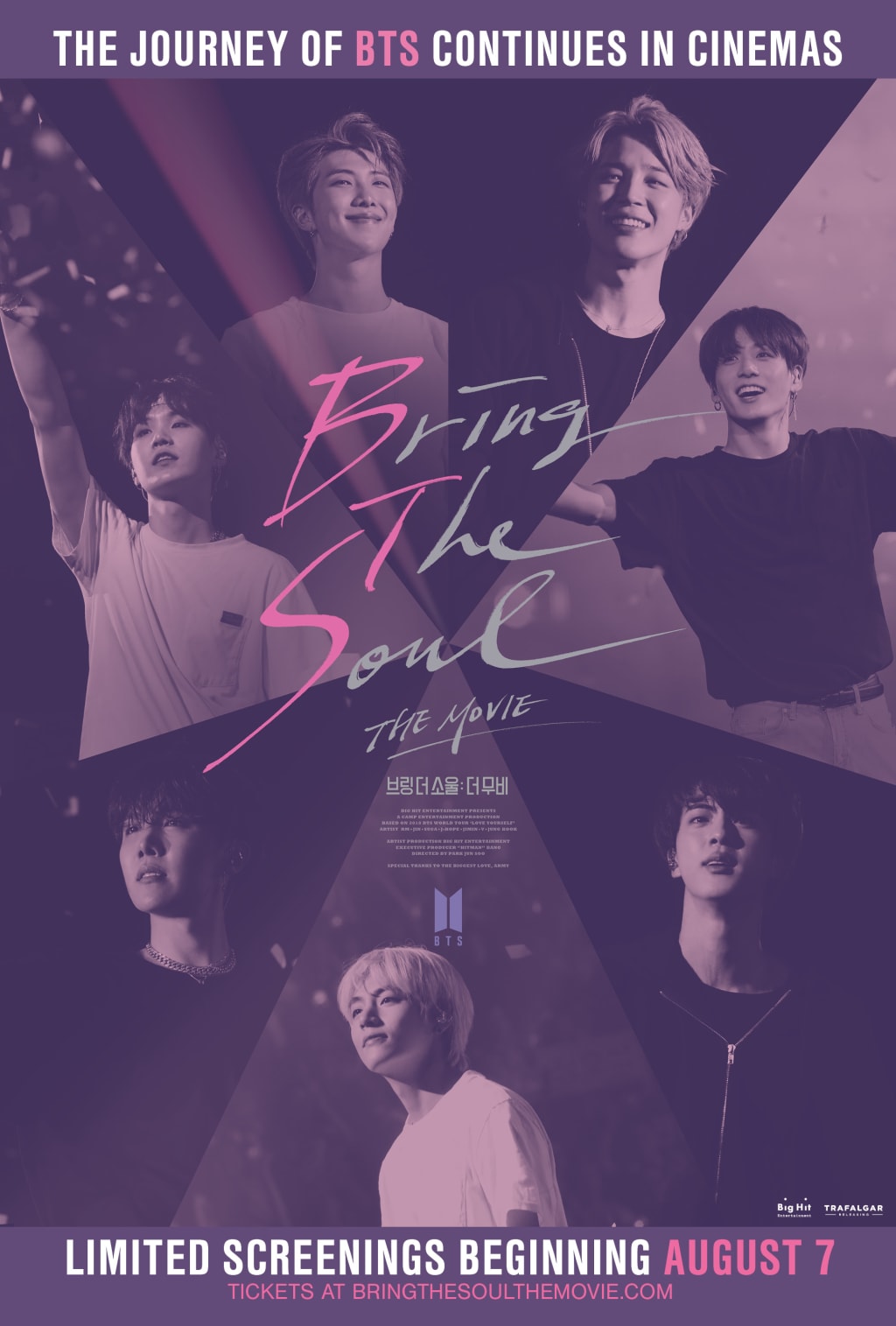Movie Review: 'BTS: Bring the Soul'
Documentary follows the biggest music act in the world on their world conquering tour.

I must admit, I am a little intimidated by the idea of writing about BTS. This Korean boy band, my apologies if that sounds dismissive, that's not my intent, has become the biggest thing in pop music not called "Old Town Road," and they've done so in a way that is very specific to the generation that has embraced it.
As a 43-year-old Gen-X film critic, I am unsure how to approach BTS as a concept. The music is not my taste, but I could say that about a lot of modern music. No, what I find intimidating is my fearful, sad and unnecessary desire to dismiss BTS as just another pop phenomenon. There is this "Old Man Yells at Cloud" meme part of my critical brain that wants to tell these kids that the thing they enjoy is shallow and meaningless even though I know that is far from shallow.
The facts about BTS indicate there is nothing shallow at all about these seven remarkable young people. Each of the members of BTS is highly educated, they each speak multiple languages, they write all of their own music, music which has been influenced by hip hop, pop, and classic R&B, while also having lyrics and themes inspired by the works of Herman Hesse, Ursula K. Le Guin and James R. Doty.
Even someone as pretentious as a film critic, such as myself, might have a hard time writing any kind of takedown of BTS; they are much, much more educated than I am, even if their music has a basic, naive simplicity that very young kids find easy to relate to. BTS also weaves relevant political themes into their work. They've been active in trying to reform the education system in Korea, which at once produced their remarkable education but did so at a price that the band members don't feel was reasonable.
Then there is the remarkable authenticity and sincerity of the themes and homage of BTS. As a Gen-Xer, I am trained by years of cynicism and irony to react very negatively to sincerity. I was raised by my pop culture influences to innately mistrust sincerity and to mock any type of genuine thoughts and feelings, at least enough to be able to disown those feelings were they proven wrong or out of fashion.
Millennials, on the other hand, the children of Gen-Xers, have rebelled against their parents by embracing sincerity and openness in a way that is, to use that word again, intimidating. I know a few Millennials, and when they speak to me with such raw sincerity, I almost don't know how to react and usually end up trying to make awkward jokes that are met most often with blank stares and a touch of poignant compassion.
The authenticity and sincerity of BTS is remarkable and is at the forefront of Bring the Soul, the new BTS concert documentary. The movie is a rather straightforward and not particularly innovative concert movie. What sets it apart and makes it so unique and of the moment are the BTS members themselves, who come off as incredibly honest, compassionate, caring and forthright.
The music may have the shouty quality of too much of modern hip hop, but instead of being about bragging about cars, planes, high-end food or clothes, the lyrics are about loving yourself, being kind to others and the things that bond humanity versus the things that drive us apart. Yes, this is straight ahead pop-hip hop, but lyrically, it is both simple and highly educated, thoughtful yet catchy in multiple languages.
There are a whole lot of things to unpack about BTS and where they fit within modern pop culture. The music of BTS is sung in Korean and occasionally English, but it sounds like it could be a One Direction or N'Sync song with a few hip hop breakdowns that pop up like the times that hip hop artists guested on pop songs of the past. You can't help but marvel at the way BTS adapts the last 20 years of pop history and then shapes it to their own unique worldview. Again, there is that sincerity and authenticity coming through.
The look of the band is fascinating. The high level androgyny is so matter of fact in Bring the Soul that I almost feel ashamed to bring it up. It genuinely appears as if BTS has evolved past the American notions of what gender or sexuality are by societal standard. This has been a hallmark of Asian culture for some time actually. The Asian culture, at least their popular culture, doesn't appear to have the same hang ups about sexuality and gender that we still have in America.
Truly, our culture is working to catch up with BTS rather than the other way around. Our popular culture may have inspired and influenced them, but their approach to our culture and the aesthetic they have cultivated since their 2013 debut is far ahead of our culture, which remains restrained by many conservative religious factions clinging to outdated beliefs.
I may not enjoy the music of BTS, but as a landmark of modern popular culture, they are fascinating. The message of BTS is life changing for those who have become fans. The positive mental health messages in their music have long been mocked in American culture; concepts like loving yourself and self-care are often derided as selfish or as ways of coddling young people, and not preparing them for the harsh reality of everyday life.
Perhaps though, this is a reframing of the idea of how we live. The messages of Love Yourself, the theme of the BTS 2018 stadium tour, and being kind to yourself and to others is the message that should be sent. Maybe if we didn't spend so much time trying to prepare kids for how harsh and unkind the world can be, we could break the cycle of unkindness.
I have barely talked about this documentary, and I apologize for that. There isn't much to talk about in terms of style or presentation. BTS: Bring the Soul is not a particularly standout concert documentary; it looks like a lot of other concert docs. It's filled with stage performances and behind the scenes hijinks and anecdotes.
What makes the doc standout is what the documentary inspires in those who choose to look into it. What I came away with was not an appreciation for the documentary form, but an appreciation for where we are as a culture and what our kids are up to. While my generation needed the anger and confusion of grunge, I can see where Millennials find comfort in the sincerity and kindness of BTS.
While my generation went out of its way to reject everything before it could reject us, a defense mechanism that still defines so many people my age, BTS reflects a millennial and younger culture that desires connection, that desires community and thrives on the reassuring messages of self care, compassion and loving yourself.
Who's to say which generation is the better off? Sarcasm! As I was saying, sincerity is hard, at least it was for my generation. I blame my parents, their generation sincerely wanted to save the world for a few years and then gave up, took drugs, invented disco and went to Wall Street and Ronald Reagan. You'd be cynical too if that was what you were born into.
About the Creator
Sean Patrick
Hello, my name is Sean Patrick He/Him, and I am a film critic and podcast host for the I Hate Critics Movie Review Podcast I am a voting member of the Critics Choice Association, the group behind the annual Critics Choice Awards.






Comments
There are no comments for this story
Be the first to respond and start the conversation.